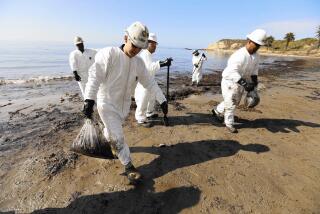Oil Pipeline Operators Settle With Critic Who Said They Spied on Him
- Share via
The consortium of oil companies that operates the trans-Alaska pipeline said Monday that it settled a lawsuit by a critic who accused the company of improperly spying on him. Terms weren’t disclosed.
The suit against Alyeska Pipeline Service Co. was brought by Charles Hamel, a retired Virginia oil tanker broker, over the conduct of private investigators that Alyeska hired in 1990.
Hamel, who helped spur congressional investigations that uncovered safety and maintenance problems on the pipeline, sued Alyeska and Florida-based Wackenhut Corp. after Wackenhut detectives, according to statements by former employees, taped Hamel’s telephone conversations, got his bank, credit and other records and searched his trash.
Alyeska countersued, attempting to retrieve from Hamel documents that Alyeska said he illegally possessed.
Alyeska is primarily owned by Exxon Corp., British Petroleum Ltd. and Atlantic Richfield Co., among other oil companies working on Alaska’s North Slope.
The agreement, announced Monday in Washington, settles both claims.
“I would have liked to see an assessment of the blame by the court, and to assess that assessment,” said Anthony N. Turrini, counsel for the Alaska Natural Resource Center of the National Wildlife Federation, an environmental group. “The measures that Alyeska took to stifle whistle-blowers, and the efforts Mr. Hamel made to exercise his First Amendment rights--and the lengths he went to exercise them--I think that society could have benefited from a little judicial guidance.”
In large part due to complaints from Hamel and a legion of dissident Alyeska inspectors and former employees, Congress and government regulators have investigated allegations of poor maintenance on the pipeline, which carries 25% of U.S. oil production.
In July, former Alyeska employees and inspectors testified at congressional hearings that they had been persecuted by the company when they reported problems on the line. Alyeska settled with five of its whistle-blowers.
A House Energy and Commerce Committee investigator found 1,000 electrical code violations at Alyeska facilities.
In October, an Interior Department study said that Alyeska not only hadn’t faced its “serious or even catastrophic” problems, but it “has failed even to recognize the need to do so.”
Since then, the head of the Bureau of Land Management, which regulates the pipeline, has called for “sweeping reforms” in Alyeska’s operations.
More to Read
Sign up for Essential California
The most important California stories and recommendations in your inbox every morning.
You may occasionally receive promotional content from the Los Angeles Times.













